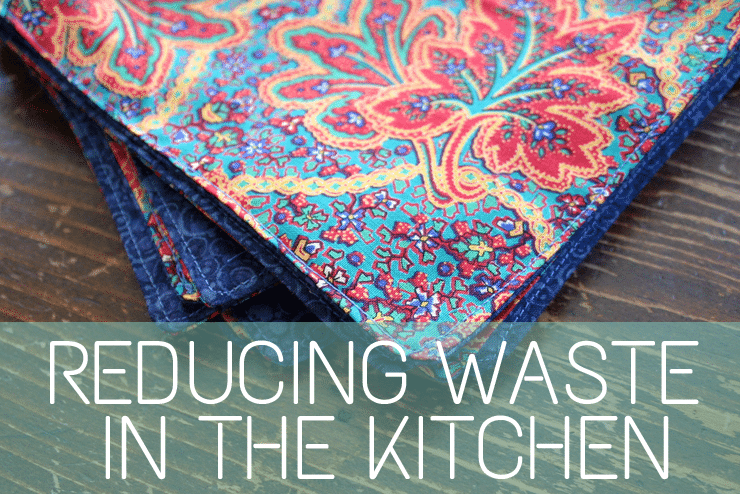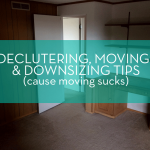 Photo credit +
Photo credit +
We hardly use any disposable products at home – partly out of a desire to reduce our waste, partly because we like to save money.
Our kitchen is entirely paperless and has been since we got married. After 6 years of this, it hardly seems like a big deal or difficult or something to share. And yet. Here I am. Talking about not using paper or many other disposable products. Here’s a little about our kitchen habits:
Dish towels instead of paper towels
When I was in college, my roommates and I would buy paper towels to use in the kitchen. As happens when you have roommates, no one wanted to be the one to go and buy new ones when we ran out one day. We just started using dish towels instead and I’ve never looked back. I remember being so surprised by how easy it was and how I’d never thought of it before. “You can just…clean up this mess with a towel? And then wash it and use it again??” Mind-blowing to a 21-year-old.
I often throw them in with the rest of the laundry, but sometimes wash them separately with wash clothes and napkins in warm or hot water with some OxiClean. I would like to get some super absorbent new dish towels. Perhaps these?
Cloth napkins instead of paper
Cloth napkins were only used for nice dinners when I was growing up, so I associate them with fancy! We use cloth napkins for every meal we eat, even the decidedly not fancy dinners. Again, I usually just throw them in with the rest of the laundry, but sometimes wash them separately if I have a ton of laundry.
You could try to sew your own or buy some pretty ones off Etsy. I am in love with these ones. I have some from Target and some made from vintage pillowcases (SO cute) that my aunt bought me from Etsy. Cloth napkins are effective and easy.
Dealing with food waste
Food scraps and produce that goes bad is a huge source of waste in our kitchen. We compost with worms during about half the year when it’s warm enough (we keep this on our back porch and buy these every spring – yep, worms in the mail!) It’s mostly my job, and surprisingly not gross, though I still don’t really touch the worms.
It doesn’t take all of the waste, however, so that is a downside composting in an apartment! To reduce our wasted produce, I try to plan meals around what needs to be used and push leftovers on Mike so we don’t have to throw away as much.
Food storage
Instead of using Ziploc baggies, foil, or Saran Wrap for lunches or food storage, we use reusable (glass or ceramic if we’ll use them in the microwave) food storage containers. My favorite are Pyrex containers and these Corningware bowls. I (used to) bring soup to work in a mason jar and just take off the metal lid to heat it in a microwave.
Much more leak resistant than anything else!
The non-plastic food storage seems to hold up better to the freezer/microwave/dishwasher, but these bento boxes are great for lunch with a sandwich and a few extras. Bonus – when lunch is easier to pack, I’d do that instead of buying, which saves money!
Room for growth
While we certainly don’t waste a ton in our kitchen, we have our fair share of plastic containers (Thai takeout, cottage cheese, etc). We could probably make more things from scratch more often to avoid the extra packaging. And despite my habit for using cloth bags most every time I shop at Target, the grocery store, or anywhere else, we still have a healthy plastic bag stash under our kitchen sink. We do our best and take short cuts sometimes, like most sane people do.





We already use cloth towels (which double as napkins). I have thought about composting before, but was unsure if it’d be easy in an apartment. Does your compost smell when the lid is attached?
I hope we’re able to edge away from plastic products in the future. For storing food in the freezer, you just use containers?
I found this post really interesting. We switched to being a low-waste kitchen before we moved overseas, but it is nothing like what we do now. We live in Ireland, and now we recycle or compost about 90% of our kitchen and household trash. We use cloth napkins, dishtowels, and diapers to cut down on some waste. Our trash has to be divided into recycling, compost and trash. The nice part is that our compost goes into a compost bin that is collected by a garbage truck. (We don’t have to maintain a compost pile, and we can get rich compost from the waste company.) It is literally just as easy to compost our food scraps as it is to throw them away! Any food product (including dairy, meat, bones, or oil) can be included in our compost bin, along with yard waste, paper towels, napkins, or unwaxed cardboard. Nearly all plastics, glass, paper, and metal can go in the recycling bin, and the remaining items go in the garbage (“rubbish”) bin. The trucks come by each week, and will empty your compost or recycling bin for free, but if you want your garbage bin emptied, you must buy a €10 ($13.50) tag for it. So it literally “pays” to recycle and compost!
Unfortunately here in New Orleans you pay extra to recycle, so crazy.